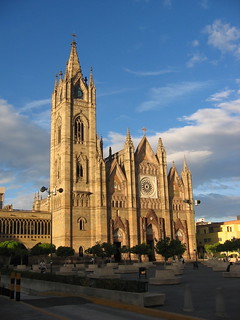
The Templo Expiatorio in Guadalajara
DAVID AGREN
The News
Cardinal Juan Jesús Posadas Ocampo went to the Guadalajara airport 15 years ago to welcome papal nuncio Archbishop Giralamo Prigione, who was coming to the country's second largest city to bless a furniture factory. But the two men never met.
Cardinal Posadas Ocampo, who was dressed in his usual clerical robes, was shot dead shortly after 5 p.m. as he stepped out of his car in front of the terminal.
A federal investigation said the prelate was inadvertently caught up in the crossfire of a shootout between the rival Tijuana and Sinaloa drug cartels, which were active in the Jalisco capital during the 1990s. Catholic officials reject the official explanation, however. They note that Cardinal Posadas Ocampo was shot at close range in an attack that also claimed the life of his chauffer and five others. No one has ever been convicted in the matter, although the investigation officially remains open.
The cardinal's death and the unresolved investigation have been long-standing sources of consternation in Jalisco, where the events of May 24, 1993 – and a massive explosion blamed on gasoline leaking into the sewer system barely 13 months prior – ushered in sweeping political and social change in one of the country's most fervently Catholic states.
"With the death of the cardinal, the government left a lot to be desired in its official explanation," said Mario Ramos González, a political science professor at the University of Guadalajara. "In the Catholic Church, there's still a lot of outrage."
Analysts credit the ascent of the National Action Party, or PAN, in the region to the general disgust with the inept government response to the 1992 explosions that flattened a five-kilometer stretch of a working class part of Guadalajara and killed at least 200 residents, and a Catholic backlash against the perceptions of a cover up in the investigation into the violent death of a popular prelate.
Agriculture Secretary Alberto Cárdenas, then the little-known mayor of Ciudad Guzmán, deposed the Institutional Revolutionary Party, or PRI, in 1994. The PAN, which tilts decidedly conservative in the region, later won consecutive gubernatorial elections in 2000 and 2006.
Columnist Jorge Zepeda, editor of the now-defunct Guadalajara daily Siglo 21 in the 1990s, compared the political impact of the explosions and assassination to the aftermath of the 1985 Mexico City earthquake, which gave rise to social movements and the left-wing Democratic Revolution Party, or PRD. But the shift in Jalisco went in the other direction, he added.
"The 1985 earthquake generated the formation of a civil society with distinct ideologies while in Guadalajara it was essentially a turn to the right," Zepeda said. "The cardinal's assassination generated a conservative militancy in defense of the church."
STATE CRIME
Speculation about what really transpired at the Guadalajara airport and who might be responsible for the cardinal's death is still rife in Mexico – even 15 years later. Theories on who might have carried out the cardinal's death range from narcotics traffickers to gunmen acting on the orders of senior politicians to the Masons.
Alfredo Araujo Ávila, a key hit man for the Arellano Felix cartel, was arrested in January and implicated in the Guadalajara shootout.
Cardinal Posadas Ocampo led an Archdiocese that was the base for narcotics trafficking gangs during the 1980s and 90s, leading to speculation that his criticisms - or relations with - might have sparked their wrath.
The Archdiocese of Guadalajara said the Araujo Ávila meant little as many Catholic officials consider the cardinal's death to be premeditated murder. Last week, the Mexican bishops' conference described the cardinal's death as "a state crime" and called on former President Carlos Salinas, who governed from 1998 to 1994, to produce more information on the matter.
Salinas has long been a polemic figure in the Cardinal Posadas Ocampo affair.
A new book by Guadalajara-area lawyers José Antonio Ortega and Fernando Guzmán – presently the No. 2 official in the Jalisco state government – alleges the former president made efforts to close the preliminary investigation.
They also allege that officials in the federal government are still hindering the investigation.
Salinas has denied any culpability in Cardinal Posadas Ocampo's death.
But the former president, according to a pair of reports by Ortega and Guzmán for then Vatican Secretary of State Cardinal Tarcisio Bertone, was seeking the intervention of Pope Benedict XVI to have the death "not declared a state crime."
The report, which was obtained by the Excelsior newspaper last May, added that Salinas was also advancing the idea that "Freemasons and public servants of that persuasion" - Fernando Gutiérrez Barrios, who passed away in 2000, was mentioned by the lawyers - possibly ordered the cardinal's murder. The lawyers also noted that Cardinal Posadas Ocampo had been under surveillance in the days leading up to May 24, 1993.
One prominent Catholic leader during the 1990s disagreed, however. Luis Reynoso, a lawyer and the former bishop of Cuernavaca, quashed the conspiracy theories in a series of investigations in the late 1990s. Reynoso died in 2000, but his nephew recently released a book based on the bishop's investigations that insists the cardinal was in the wrong place at the wrong time and no proof of premeditated murder exists.
UNSATISFACTORY INVESTIGATION
Salinas left office in late 1994, but during the administration of his successors – Former Presidents Ernesto Zedillo and Vicente Fox – the investigation "did not advance," according to the reports by Ortega and Guzman.
"There hasn't been any will on the part of the government," said Adelberto González, spokesman for the Archdiocese of Guadalajara. "Until now there hasn't been a single conviction for having the cardinal murdered."
Church officials insist they're not looking for revenge. Cardinal Posadas Ocampo's successor, Cardinal Juan Sandoval, said in a statement issued last week, "The church wants to know the truth – even so that we know whom to forgive.


No comments:
Post a Comment